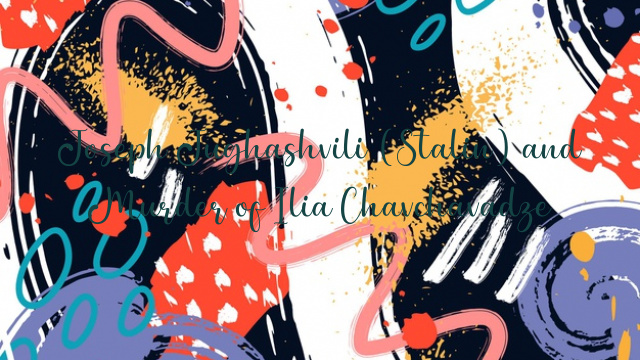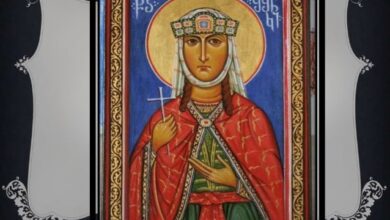
Joseph Jughashvili (Stalin) and Murder of Ilia Chavchavadze
by
Professor Tengiz Simashvili
Iakob Gogebashvili Telavi State University, Georgia
Email: tengizsimashvili(at)yahoo.com
Electronic Research Journal of Social Sciences and Humanities
ISSN: 2706 – 8242 www.eresearchjournal.com
Vol 2: Issue III
Jul – Sep 2020
Abstract
The archives of Georgia contain many interesting documents about Joseph Stalin. One of the most significant documents among them is a letter on September 5, 1907. It is mention, that somebody with last name Nizharadze was the suspect in Ilia Chavchavadze’s assassination. It is quite possible that this surname contains extremely important information to the study of Joseph Jughashvili (Stalin)’s biography. The point is that in 1908, Joseph Jughashvili (Stalin) was arrested in Baku with a false passport under the name of Gaioz Nizharadze. According to the archival materials which I have discovered so far, it becomes evident that the false passport under the name of Nizharadze was issued on April 7, 1906. On the one hand, such a coincidence of surnames directly indicates Joseph Jughashvili (Stalin)’s involvement in Ilia Chavchavadze’s assassination. However, on the other hand, while working on the archival documents in Georgia regarding Ilia Chavchavadze’s assassins: Iliko Imerlishvili, Ivane Inashvili, Pavle Fshavlishvili,
and Gigila Berbichashvili, I could not find any information about Joseph Jughashvili’s or “Nizharadze’s” involvement in Chavchavadze’s murder. Although the information and documents, examined in this article, are to some extent
contradictory, the analysis of them makes it evident that Joseph Jughashvili’s Biography is not sufficiently studied.
Keywords: The Georgian achieves, Murder of Ilia Chavchavadze, Joseph Stalin, Biography, Terrorists, Historiography
Introduction:
There are quite interesting materials about Joseph Jughashvili (Stalin) in archival materials of the murder of Ilia Chavchavadze. Ilia Chavchavadze was the great Georgian writer, sometimes called “Father of Nation”. On August 30, 1907, the killers awaited Ilia Chavchavadze’s phaeton on the road near Tsitsamuri and Saguramo villages, near Tbilisi capital of modern Georgia. Ilia Chavchavadze and his servant were killed and Ilia’s wife was brutally beaten.
According to archival and other historical documents, four or five people participated in the assassination of Ilia Chavchavadze. Today we know that the killers were Ivane Inashvili, Pavle Pshavlishvili, Gigla Berbichashvili, and “Imereli,” who is referred to as “One Imereli” in some documents, and “Imereli” in others. In one document he is called “the leader of Ilia Chavchavadze’s killers’ gang”. According to acceptable documents, the fourth killer under nickname “Imereli”, was Iliko Imerlishvili. He was an active member of the Bolshevik party in Georgia.
According to the memories of revolutionaries, Joseph Jughashvili (Stalin) participated in the meetings of “Red Detachments” where Gigla Berbichashvili and Iliko Imerlishvili were, and he had with them close relations. There is a question, who was the fifth member of the Ilia Chavchavadze killer group? I try to give the answer in my research.
Methodology:
For analyzing information archival documents I guided with the following methods and principles of modern scientific research:
i. Comparative Method – comparing historical objects with time, analyzing and revealing similarities and differences;
ii. System Method – making a generalized model by using materials found out during the process of investigation, which will be the reflection of the real situation taking, place in social interrelations and upheavals typical to historical process, or present-day situations;
iii. Retrospective Method – investigating past gradually, in order to find out genuine reasons for occurred historical events;
iv. Logical Method – making objective analysis about the situations in order to shed light on the historical development stages and define boundaries for separate historical ones;
v. Chronological-Problematic Method – studying problems of chronological occurrences thoroughly;
vi. Historical-Comparative Method – investigating the past from present including the current situation by using comparative analysis of historical events and processes.
Content:
I found out quite interesting materials about Joseph Jughashvili (Stalin) in “Ilia Chavchavadze’s (*1) Murder Investigation Case of Tbilisi Criminal Investigation Department” kept in the Central Historical Archive of Georgia.
A few days after Ilia Chavchavadze’s murder, an operating officer of the Tbilisi Criminal Investigation Department, someone called Pitskhelauri writes two letters to Piotr Evtushevsky, Head of Tbilisi Criminal Investigation Department (*2). Actually they are unofficial notifications about the identity of the persons participating in this murder. Here is a translation of the Russian text (Tbilisi Criminal Investigation Department Materials, 1907):
“Dear Piotr Alexandrovich! Ilia Mtskheteli resident of village Mtskheta, Dusheti District, should know about Ilia Chavchavadze’s murder. If he did not participate in the crime, then he will know who did it as he knows who commits such a crime, that’s why I suppose to arrest him. Besides, it is inevitable to arrest a driver of phaeton. As I’ve investigated he knows people who committed Chavchavadze’s murder.
Sincerely, Yours
Pitskhelauri
Tpilisi city
September 4, 1907.”
This letter is interesting for the researchers as on 4 th September of 1907 it was known for the investigation that Bolshevik terrorist Iliko Imerlishvili was participating in Ilia Chavchavadze’s murder. The fact is that Iliko Imerlishvili’s nickname in a terrorist organization, which was created by Social-Democrat Labour Party members in Tbilisi, “Mtatsminda Group” was “Ilia Mtskheteli.”
Accordingly, about the identity of Iliko Imerlishvili and “Ilia Mtskheteli” was known for the police, however, the investigation is not done in this regard. This letter, existing in the above-mentioned archive material, is followed by the second letter sent to Piotr Evtushevsky, head of Tbilisi Criminal Investigation Department by Pitskhelauri, dated to the 5 th September of 1907 (See photo 1) (Tbilisi Criminal Investigation Department Materials, 1907). Here is an English translation of the Russian text:
“Dear Piotr Alexandrovich! Nizharadze, a suspected in Ilia Chavchavadze’s murder, is arrested in Borjomi; as I clarified secretly, a watch of the murdered was found with him; the driver of the Phaeton is arrested as well. They do not want to divulge about the watch as they think participants of the murder can be hid.
Sincerely, Yours
Pitskhelauri’
5 th of September 1907 year.”
I have mentioned about presumable participation of “Ilia Mtskheteli” and “Nizharadze” in Ilia Chavchavadze’s murder in my book published in 2011 “Social-Democrat Bolshevik Terrorists, Murderers of Ilia Chavchavadze.” (*3) I think that by highlighting a number of newly found documents, in my research I clearly substantiated that both identities or nicknames – “Ilia Mtskheteli” and “Imereli“ – belong to Iliko Imerlishvili and Iliko Imerlishvili directly participated in Ilia Chavchavadze’s murder. However, I did not publish the results and detailed analysis of my research carried out in order to identify “Nizharadze” – presumably participant in Ilia Chavchavadze’s murder. I was trying to find additional materials as this surname may contain too much important information about Joseph Jughashvili’s (Stalin) biography.
The fact is that in 1908 Joseph Jughashvili was arrested in Baku with a fake passport on the name of Gaioz Nizharadze. There are copies of the archived documents related to this issue in archive of the Ministry of Internal Affairs of Georgia. One of the papers is a secret letter sent by the head of Gendarmerie Department Baku Governorate on 31 st May of 1908 to the deputy head of Gendarmerie Department of Kutaisi Governorate in Batumi (Former Party Archive Materials, 1908):
“On 25 th March of the current year a person residing at Baku with a fake passport on the name of Gaioz Nizharadze was arrested in Baku. During interrogation Nizharadze confessed that his real name is Joseph Jughashvili and he is a peasant of Didi Lilo village society of Tbilisi Governorate and District, and in 1902 he was arrested by Gendarmerie Department of Kutaisi Governorate in Batumi for propagation and exiled in Yakutsk for three years; in 1904 he left the place of exile willfully.
Attaching the photo in order to identify the person depicted on it and personated himself as Joseph Jughashvili; if he was accused and what kind of information do you have about him.
Gendarmerie Rotmister …”
This document is well known for the historians, but the document retrieved by me about “Nizharadze” participating in Ilia Chavchavadze’s murder was unknown. That is why I have mentioned above that I would like to find out more materials and then publish my analysis. Unfortunately, because of objective reasons, which I will mention at the end of this paper, I did not have an opportunity to do this.
From currently discovered materials it becomes clear that a fake passport on the name of Gaioz Nizharadze was issued on 7 th April of the 1906 year (Островский, 2004). It is likely that Joseph Jughashvili “bought” it instead of the passport issued on the name of Giorgi Berdzenishvili which was seized by the police in March 1906.
There is another document which is related to the identity of Joseph Jughashvili and Gaioz Nizharadze. This is a copy of superscription (resolution) on a letter of the Head of Gendarmerie Department of Tbilisi Governorate dated by 10 th June of 1908 and sent to the Head of Gendarmerie Department of Baku Governorate on 31 st May of 1908 (Former Party Archive Materials, 1908):
“… A person with a fake passport on the name of Gaioz Nizharadze residing at Baku confessed that his real name is Joseph Jughashvili – a peasant of Didi Lilo village society of Tbilisi Governorate and District, and in 1902 he was arrested by Gendarmerie Department of Kutaisi Governorate in Batumi for the activity in Tbilisi Social-Democratic Party and exiled in Yakutsk for three years; in 1904 he left the place of exile willfully.”
In this document, Joseph Jughashvili’s party affiliation is already specified. In the next document – a secret letter by Deputy Head of Gendarmerie Department of Kutaisi Governorate in Batumi Region dated on June 13, 1908, sent to the Head of Gendarmerie Department of Baku Governorate (Former Party Archive Materials, 1908):
“In response of your letter dated by May 31, 1908 I would like to let you know that Joseph Jughashvili, a peasant of Didi Lilo village society of Tbilisi Governorate and District, was arrested and exiled in Yakutsk for three years for propagation in 1902. In fact in my subordinate clause he was related with the investigation of an anti-state case (*4). His crime was that he was a main head and teacher for Batumi labors as well as labors’ revolutionary movement which was expressed in distribution of propaganda leaflets and calls for overthrow the existing system. According to the photo, none of my employee and police officers could identify Jughashvili because of passing a long period of time.
Also, I think, it is necessary to add that the above-mentioned Jughashvili, as it is shown in the materials collected under my guidance, as accused person, he was indeed related with the investigation on the case of “the circle of Tbilisi Social-Democrat Labor Party” lead by Gendarmerie Department of Tbilisi Governorate and he was the main accused person.
Signature
Gendarmerie Rotmister…”
As I mentioned, the copies of the above-mentioned documents are kept in Party Archive of the Ministry of Internal Affairs of Georgia. And below mentioned document is a resolution of General-Major Kozintsev, ahead of Gendarmerie Department Baku Governorate, dated by August 4, 1908, and sent to the head of Gendarmerie Department of Tbilisi Governorate (*5). The original document is kept in one of the materials of the Central Historic Archive of Georgia (See photo 2) (Caucasus Region Secret Police “Okhranka” Materials, 1908):
“Resolution No. 4287
On 4 th of August 1908 in Baku I, the head of Baku Gendarmerie Province Department, General-Major Kozintsev, discussed the correspondence in order to state the political reliability of a person who was named as Gaioz Nizharadze and in fact, who seemed to be Joseph Jughashvili, and I found out as follows:
On 25 th of March of the current year Baku Criminal Investigation Department arrested an unknown person who names himself as Gaioz Nizharadze resident of village Maglaki of Kutaisi district, and which had a party correspondence during searching. In the correspondence on this issue it was cleared out that Nizharadze is Joseph Jughashvili – a peasant of Didi Lilo village society of Tbilisi Province and District, and in 1902 he was related with the investigation by Kutaisi Gendarmerie Province Department according to article 251 and Tbilisi Gendarmerie Province Department, the first part of article 251. Finally the case has been solved administratively and Jughashvili was exiled in the Eastern Siberia under an open supervision of police and from where he has escaped and he was wanted by the police department circular on the 1 st of May 1904. Since 25 th of March of the current year Joseph Jughashvili is arrested in Baku prison. I suppose to exile Joseph Jughashvili for three years in the Eastern Siberia under supervision of police.
Verified: the above-mentioned correspondence should be sent to Baku in a disposal of city head.
Signature:
Gendarmerie General-Major Kozintsev.” (*6)
Information about Joseph Jughashvili’s activity under the surname of “Nizharadze” and his arrest in March 1908 is provided not only in Lavrenti Beria’s book but in other authors’ works as well, including modern ones; I will mention this below. Now, I would like to note that in the archive document mentioned above considering “Nizharadze” as a killer of Ilia Chavchavadze, put things in a new light on the version drawn by a friend of the youth of Joseph Jughashvili (Stalin),
Iioseb Iremashvili. His point of view is expressed in his book published in 1932 in Berlin: “Stalin und die Tragödie Georgians” (Stalin and the Tragedy of Georgia). There is written that Joseph Jughashvili had a relation with Ilia Chavchavadze’s murder.
Consequently, on the one hand, the concurrence of the surnames directly suggests Joseph Jughashvili’s participation in Ilia Chavchavadze’s murder. On the other hand, while working on the materials of Ilia Chavchavadze’s murder, while researching materials kept in Georgian archives about physical murderers of Ilia – Iliko Imerlishvili, Ivane Inashvili, Pavle Pshavlishvili, and Gigla Berbitchashvili, I could not find any other allusion about the participation of “Nizharadze” or Joseph Jughashvili in this murder.
As it is said in the above-mentioned document “Nizharadze”, suspected in Ilia Chavchavadze’s murder, had Ilia’s watch with him when he was arrested. I consider it interesting for the reader that Stalin, as well as many other people, had a hobby – he was collecting the watches. In 1940-1949 years in the memories of ahead of “Sovnarkom” (*7) affairs I. E. Chaadaev mentioned that Stalin was collecting the watches and he had a collection including both wristwatches and the so-called pocket watches (Куманев, 2005). I have investigated identity, revolutionary activities of terrorists, and members of “Red Detachment” acting in that period in Borjomi and surrounding territories. One among them was Alexander Tsagurishvili – “Poria”. He was one of the most famous robbers and terrorists acting in Borjomi Gorge for that period of time. This person was connected and had friendly relations with the participants of Ilia Chavchavadze’s
murder, Bolshevik terrorist Iliko Imerlishvili, as well as with Kamo (Ter-Petrosyan), Batchua Kuprashvili, and others. However, I could not find any terrorist acting under the name of Gaioz Nizharadze or just Nizharadze in Borjomi in 1906-1908.
But, during my academic research, I was able to found out that in March 1908 there was someone Sh. Nizharadze, who was imprisoned at Bailov prison in Baku with Joseph Jughashvili. In one of the documents we read (Former Party Archive Materials, 1908):
“Stalin was imprisoned at Bailov prison, in the third cell, there was Sergo Orjonikidze in this cell as well… we wanted to escape from the third cell and we brought Sh. Nizharadze inside.”
I have discovered a photo of Shalva Nizharadze son of Vasil in the files of Gendarmerie Department of Tbilisi Governorate, but I could not find any additional material about him yet and I still continue my investigation concerning this issue.
Herewith, I would like to mention that some authors of the works about Joseph Jughashvili variously refer “Nizharadze” in connection with him. For example, V. S. Kraskova in her book “Crimes into the Kremlin Walls” writes (Краскова, 1999):
“There were more people inside the dungeon in which Vishinski had appeared than it was possible. Bed was occupied by one person who was brought there in March. In police papers he was mentioned as Gaioz Nizharadze. Prisoners called him Koba, but his real name was Joseph Jughashvili, or Stalin. In the corner, a leg-bended, backwarded from everyone, he was learning “future language” Esperanto during the hours.” (*8)
M. S. Aldanov wrote (Гусляров, 2003):
“After a “failure” of the first revolution Lenin’s right hand in implementation of “expropriation” became – at that time already a well-known Caucasian “militant” with a revolutionary nicknames: “Koba”, “Davit”, “Nizharadze,” “Chizhikovi,”“Ivanovich” – almighty Russian dictator Joseph Jughashvili.”
According to another author, Soviet diplomat (*9) G. Z. Besedovski, a fugitive in the Western Europe in 1929, Stalin was in agreement about the actions of robberies with Lenin (Беседовский, 1931):
“Joseph Jughashvili – Koba … started executing the orders of his leader and got a new nickname. Now he was called Nizharadze. He started leading a militant activity under this nickname. Soon Nizharadze found a very good leader for a combat organization, Armenian, Petrosyan.” (*10)
According to Besedovski, Nizharadze – Stalin was not only a leader of expropriations, but he was participating in those actions as well (Беседовский, 1931):
“Nizharadze fired the first bomb from the roof of Sumbatov’s house during the expropriation in Tbilisi at Erevan Square on June 13, 1907.”
For various reasons, I was unable to find the archival documents, which can prove the opinions of the above-mentioned authors. However, considering that a number of authors think that Stalin was directly leaded and participated in the expropriation on June 13, 1907. I think maintaining the research in this direction will give us quite interesting results. Moreover, several archive materials unknown until now were discovered, as well as separated documents which are about episodes concerning the participation of Joseph Jughashvili’s closest surrounding in the expropriation on Erevan Square on June 13, 1907.
As for Nizharadze, while investigating his identity, it was found that knyaz (*11) Nizharadze is mentioned concerning the event that is taking place on the edge of 1905 and 1906, in a book of a famous mystic and philosopher George Gurdjieff residing in Georgia – “Meetings with Famous People.” (*12) At the beginning of the 1900s “Knyaz Nizharadze” was a participant of an expedition in the countries of the Persian Gulf with George Gurdjieff in order to search a secret (esoteric) knowledge. According to existing notes, in the above-mentioned book of George Gurdjieff a separated chapter was dedicated to “Knyaz Nizharadze”, but for some reason, the author did not publish it.
Some of the authors consider Joseph Jughashvili under the name of “Knyaz Nizharadze,” as they think he was a student of George Gurdjieff and they interpret the relation of these two persons variously (*13). From the documents discovered during my research, it is clear that in March-April 1906 George Gurdjieff was teaching how to make explosives, barricade fighting in the city, and other “useful skills” to the group of six persons including Bolsheviks and Mensheviks.
The teaching place was located on the second floor of a famous “Avlabari Illegal Printing House” building. Moreover, a number of sources name him as a police agent, a traitor of the so-called “Military – Technical Group” and “Avlabari Illegal Printing House”. Historian Alexander Kotchlavashvili dedicated broad research to this issue under the title – “His Real Identity,” which is kept in his archive and is not published yet. Furthermore, the author translated his research in Russian as well, but the title of the Russian version is “George Gurdjieff – an Agent of Tsarist “Okhranka” (Kotchlavashvili Personal Archive, Division of the Literature and Art Materials, 1961). According to Alexander Kotchlavashvili, George Gurdjieff was “a Secret Agent” of Tsarist Government. However, from the analysis of archive materials that I have found, George Gurdjieff espionage activities cannot be established for that period of time. On the contrary, as it turns out that he was in close relation with Social-Democrats. According to one source, George Gurdjieff was recommended as a teacher for “Military – Technical Group” by Bolshevik Mikha Botchoridze, and according to another one, by a famous Menshevik Silibistro Jibladze. It is interesting that during the Soviet period George Gurdjieff was named as a Menshevik (Заря Востока, 1937).
According to archive documents, George Gurdjieff lived in Khashuri (*14) in January 1906 (Gendarmerie Department of Tbilisi Governorate Materials, 1906). Moreover, he was teaching the activists of the Social-Democrat Party including Vladimer (Valerian) Bilanov (Bilanishvili) how to make explosives. Presumably, Iliko Imerlishvili, Alexander (Sasha) Oboladze, Gigla Berbitchashvili (*15) and others together with him were mentioned as members of armed detachments
of both parties (*16) of Social-Democrats, created in order to avoid Armenian-Tatar clashes in autumn 1905. According to various accounts, these armed detachments were commanded by Isidore Ramishvili from the Menshevik party and Joseph Jughashvili from the Bolshevik party.
Therefore, it is interesting and noteworthy as some authors consider that not George Gurdjieff, or another person, or even a group of persons, but Joseph Jughashvili himself was an apostate of “Avlabari Illegal Printing House”. At the beginning “Avlabari Illegal Printing House” was located in a basement and in March-April, 1906 rooms of upper floors were used for “teaching” of the united so-called “Military – Technical Group” of Bolshevik-Mensheviks. In addition, if we consider that the closest friend of Joseph Jughashvili, Mikha Botchoridze (Botchorishvili) was connected to “Avlabari Illegal Printing House.” I think it is required to carry out additional research about this issue.
Conclusion:
In foreign archives and fonds including France, the United State of America, there are a number of materials and documents which deals with Joseph Jughashvili’s (Stalin) biography. For example, from the analysis of materials that I have revealed, we can find more answers on issues concerning identification of “Nizharadze”, a presumable participant in Ilia Chavchavadze’s murder, and his possible equating with Joseph Jughashvili in the Russian archive materials of Hoover Institution at Stanford University. Those materials can provide answers that can confirm or deny such identifications.
Although the information and documents, examined in this article, are to some extent contradictory, the analysis of them makes it evident that Joseph Jughashvili’s Biography is not sufficiently studied.
(*1) Ilia Chavchavadze was the great Georgian writer, sometimes called “Father of Nation”. According to archival and other historical documents, four people participated in the assassination of Ilia Chavchavadze. On August 30, 1907, the killers awaited Ilia Chavchavadze’s phaeton on the road between Tsitsamuri and Saguramo, a few kilometers away from Saguramo. Ilia Chavchavadze and his servant were killed and Ilia’s wife was brutally beaten.
(*2) Peotr Evtushevski was investigating Ilia Chavchavadze’s murder.
(*3) It is interesting that “Nizharadze” and “Ilia Mtskheteli” are mentioned as suspected in Ilia Chavchavadze’s murder in the table of contents of above-mentioned archive material.
(*4) There was a subordinate department of Tbilisi “Okhranka” in Batumi, so-called Batumi “Okhranka.”
(*5) Received on August 7, 1908
(*6) The copy of this document, as it seems from the analysis of the text that it is taken from Baku archive, I found it in Lavrenti Beria’s report published as a book, see: L. Beria. On the Issue of History of Transcaucasian Bolshevik Organization (Report at Tbilisi Party Meeting July 21-22, 1935). The 6 th edition. Tb. 1945, pp. 208-209. (In Georgian)
(*7) Council of Public Commissars of the Soviet Union.
(*8) В. С. Краскова. Преступления за кремлевской стеной. Минск. 1999, с. 113–114
(*9) the former left-wing Socialist-Revolutionaries
(*10) Kamo (Arshak Ter-Petrosyan).
(*11) Nobleman.
(*12) The fact that George Gurdjieff was in Tbilisi during those years is confirmed by the archival documents that I have found. I will devote special research about this issue in another paper.
(*13) There are a number of materials about the relation of George Gurdjieff and Stalin-Nizharadze in currently published popular occult, esoteric literature, as well as in Internet resources. The speech is about the topic such as esoteric-mystical schools, occult practice
(*14) Mikhailovo at this time.
(*15) They all were Bolsheviks.
(*16) Mensheviks and Bolsheviks
Photo 1 Tbilisi Criminal Investigation Department Materials, 1907
Photo 2 Caucasus Region Secret Police “Okhranka” Materials, 1908
References
Caucasus Region Secret Police “Okhranka” Materials. (1908). Secret documents and materials. The Georgian Central Historical Archives. Fond 94. Description 1. Case 157, p. 34
Former Party Archive Materials, (1908). Relation with prisoners. Archive of Ministry of Internal Affairs of Georgia. Division II. Fond 8. Description 2 (I). Case 42, p. 33-39
Former Party Archive Materials. (1908). Copies of secret documents. Archive of Ministry of Internal Affairs of Georgia, Division II. Fond 8. Description 5. Case 207, p. 27, 28, 53
Gendarmerie Department of Tbilisi Governorate Materials. (1906). Documents from region. The Georgian Central Historical Archive. Fond 153. Description 1. Case 761, p. 51
Jurakhonovich, K. S. (2020). Pilgrimage Tourism in Uzbekistan; Problems and Solutions. Electronic Research Journal of Social Sciences and Humanities, 2 (II), pp. 262-265
Kotchlavashvili Personal Archive. (1961). George Gurdjieff and secret police. Central Archive of the Contemporary History. Division of the Literature and Art. Fond 269, Case 3. p.1-37
Simashvili, T. (2020). Fake Grave of Stalin’s Father and Modernity: Materials for Biography of Joseph Stalin. Electronic Research Journal of Social Sciences and Humanities, 2 (III), pp.
23-37
Tbilisi Criminal Investigation Department Materials. (1907). Murder of Ilia Chavchavadze, The Georgian Central Historical Archive. Fond 97. Description 2. Case 35, p. 25, 26.
Беседовский Г., З. (1931). На путях к термидору. Париж. с. 350, 351
Гусляров Е. (2003). Сталин в жизни: систематизированный свод воспоминаний современников. Москва. с. 60
Краскова.В.(1999). Преступления за кремлевской стеной. Минск. с. 113–114
Куманев Г. (2005). Говорят сталинские наркомы, Смоленск., с. 512
Островский А. (2004). Кто стоял за спиной Сталина?, Москва. с. 291




